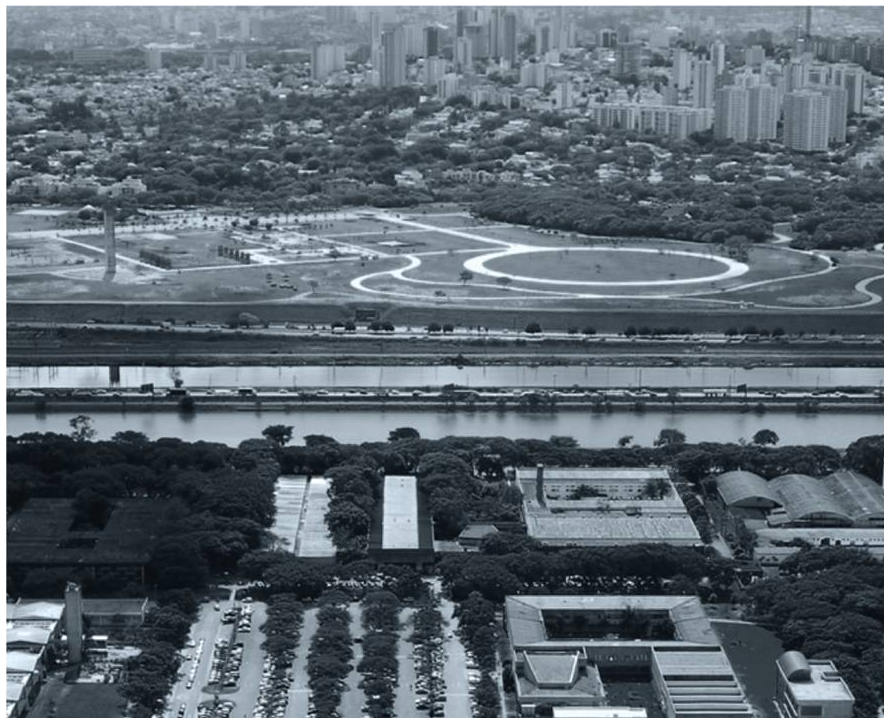ABOUT GAESI
Headquartered at the Polytechnic School of the Universit of São Paulo, the GAESI is a group that works in the areas of research and development of automation technologies and management processes. Its work is mainly focused on the field of automation, of developing and managing ports, airoports, logistics, cargo track and trace, urban mobility and smart cities.
Coordinated by Prof. Dr. Eduardo Mario Dias, full professor of USP, GAESI's staff consists of doctors, masters and PhD students of the University of São Paulo and other renowned educational institutions.
In its more than 20 years of experience, GAESI has dozens of international publications, doctoral thesis and master's dissertations. Also, the work developed, specially with major clients such as Petrobras, the State of São Paulo, the City of São Paulo and the Companhia Docas do Rio de Janeiro, created the basis for proposing seven post graduate subjects at USP.



FILOSOFIA INSTITUCIONAL
- MISSION
Apply new technologies in day-to-day society, implementing innovative projects focused on improving the quality of life and development of the country.
- VIEW
Become a reference in the field of applied research in Brazil and abroad.
- VALUES
Proactivity: analyze scenarios and take initiative to innovate.
Excellence: take the highest level of quality in all its projects.
Commitment: understand, assume and fulfill responsibilities.
Innovation: offer cutting-edge services.
SMART CITY
Smart Cities are communities that consciously use information technology to transform life and work relations within its territory. In this context, GAESI acts as a driving force for the formation of these spaces on three fronts: urban janitorial, through the collection of eletronic data and georeferencing with the aim of creating municipal situation rooms and surveillance systems in several areas; tax management, through automation of eletronic tax documents issue, and urban mobility working as a planner in the field of automation and system integration (traffic with transport systems) and of logistics for the implementation of transport policies and circulation that aims to provide a wide and democratic access to the space.

GAESI'S PROJECTS ON THE SMART CITIES FIELD
TRAFFIC SIGNAL INTEGRATION - CITY OOF SÃO PAULO
The traffic lights of the city of São Paulo have 3 types of proprietary technology and they do not communicate with each other. The project uses open protocol to allow traffic signal integration. It applies the open protocols UTMC (Urban Traffic Management & Control), developed and widely applied in the UK, and NTCIP (National Transportation Communications for Intelligent Transportation System Protocol), developed and largely used in the United States. It should be emphasized that this project allows cities to create a center for urban mobility integrating, for example, traffic systems with transport systems.
URBAN JANITORIAL - CITY SÃO PAULO
Creation of situation rooms to improve the management capacity of the city through electronic data and georeferencing. The adoption of these technologies allows to integrate real-time information collected by its external employees to the central administration. The Immediate communication and feeding of database directly by eletronic documents (created for the perfomance of services) optimizes and provides effciency to the work performed. In addition to these benefits, the indicators created will help the manager to make a more adherent decision to the conditions of the city.

LOG-MOB
Technical support for the creation and development of the Laboratory of Logistics, Urban Mobility and Environmental Implications (LOG-MOB) of the Fundação Paruqe Tecnológico de Santos. The mission of this laboratory is to improve mobility and logistics processes through research, development, simulation and predictive study, always with the adoption of a systemic and interdisciplinary view. These improvements (of logistics and mobility) allow an increase, respectively, in service accordance with the demands and in quality of life, always considering the efficiency, sustainability and the ethical commitment to the process.
TAX MANAGEMENT
SECRETARY OF FINANCE OF THE STATE OF SÃO PAULO
SECRETARY OF FINANCE OF THE CITY OF SÃO PAULO
Automation of issuing tax documents in order to eliminate accessory obligations and to prevent tax evasion. The documents issued electronically follow the conditions established by Provisional Measure No. 2,200-2 and are endowed with legal validity. Additionally, the entire operation is recorded with a time stamp of operations which is controlled by the tax authorities. In this context, electronic documents are guaranteed for authenticity, integrity and non-repudiation. In other words, it is known who generated the document, if the document has no changed and the author of the document can’t deny his authorship.

TRACK AND TRACE
Track and Trace is the ability to trace back and to follow up the path, application, location and use of product, which is extremely important for company logistics and quality control.
In this field, GAESI acts in strategic planning through track and trace solution’s research. Its main areas of expertise are secure supply chain and traceability applied to animal protein, medical drugs equipment control with access restrictions.
GAESI'S PROJECTS ON THE TRACK AND TRACE FIELD
EQUIPMENT CONTROL AND RESTRICITON OF ACCESS TO CONTROLLED AREAS PILOT – PETROBRÁS
Creation of an integrated monitoring environments computer system to control equipment in controlled areas. The monitoring will be possible through the implementation of an integrated solution for system, equipment and services, with the concept of Virtual or electronic Fence, and the development of methodologies and tools employing RFID (Radio Frequency Identification) technology.
Development of a traceability model for a specific supply chain based on the analysis of relevant legislation, on a survey of the needs of the market, on the evaluation of the available technologies, such as two-dimensional barcode (eg Datamatrix and QRCode), RFID and electronic seal.
Initially applications are being developed for the track and trace of animal protein (cattle, poultry and pigs), track and trace of medical drugs and fuel distribution, with support from the public sector and the private sector.
SECURE SUPPLY CHAIN – FINEP
Development of an open platform, applied to the supply chain, fit to government requirements and security recommendations of national and international notorious institutes in the sector. The system, which adheres to the International Ship and Port Facility Security Code – ISPS – Code, aims to introduce agility, traceability and safety procedures performed in transport, handling and storage of cargo along logistics chain.


LOGISTICS
The GAESI develops tools management, such as storage planning, products movement and distribution, always with focus on innovation. It should be emphasized that in this field, GAESI developed several solutions for Brazilian port system.
GAESI'S PROJECTS ON THE LOGISTICS FIELD
MANAGEMENT CONTROL, FINANCIAL AND OPERATIONAL SYSTEM – CODESP
Solution developed because of the bug of the year 2000 for administrative, financial ans operating control of a port authority. This system consists of modules such as payroll, inventory control and accounting.
AUTOMATION OF ELECTRONIC SCALES – CODESP
Development of a system that stores in a database the information of weights and generates management reports. The weightings are done automatically by incorporating digital technology to road scales, installing sensors to monitor the entry and exit of the truck on the weighing platform and integration of computerized systems in operation at terminals.
Creation of a new system to manage processes of cargo in containers inside the port (Santos) and container cargo offshore (Macaé). The project aims at the delivery schedule, and by consequence, the sequencing of the demands required of handling of cargo, eliminating unnecessary load circulation, organizing and prioritizing its handling, optimizing resources and producing management reports that assist in increasing the efficiency of port operations.
PORT SECURITY – DOCKS COMPANY OF THE STATE OF SÃO PAULO
Development of a safety port system, mandatory for the ports of the countries signatories of the International Ship and Port Facility Security Code – ISPS-Code, which enables access control of people, vehicles and loads.
RETROPORTO SYSTEM – EUDMARC
Development of a system to control the operational functions of dry ports. The developed system is a powerful management tool of major port activities. It has modules for containers, general and bulk cargoes. The main modules are: port operations bonded port facility management, export dry bulk terminal management, import solid bulk terminal management.
Creation of the first internet system integrating the port authority with the public sector and the private sector in order to automate document processes such as docking, the cargo manifest and loading and unloading bulletin.
CONTROL OF GRAINS TERMINALS – TERMINAL T39 OF THE PORT OF SANTOS
Development of a system for controlling the operations of a grain terminal. Stands out the integration of the grain terminal operating systems with ERP (Enterprise Resource Planning), for example, SAP. This system provides data integration foreseen by the law with the IRS, the Port Authority and other stakeholders in the public sector.
DASHBOARD – PETROBRAS
Specification of indicators and development and implementation of a system to integrate diverse sources of information to create a dashboard dedicated to the monitoring of logistics activities, plus the ability to display a unitary view of time spent on each link of the chain to support the logistics operation service to platforms. GAESI was responsible for carrying out the specification and implementing a control panel that integrates information from systems existing in Petrobras.

PORT SECURITY – DOCKS COMPANY OF THE STATE OF SÃO PAULO
Development of a safety port system, mandatory for the ports of the countries signatories of the International Ship and Port Facility Security Code – ISPS-Code, which enables access control of people, vehicles and loads.
